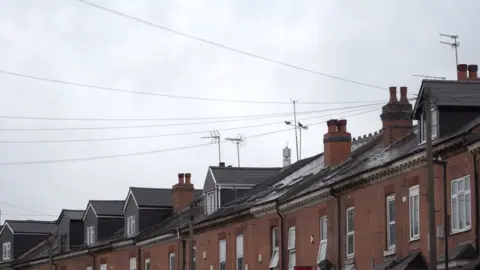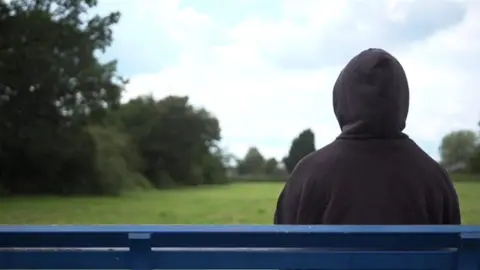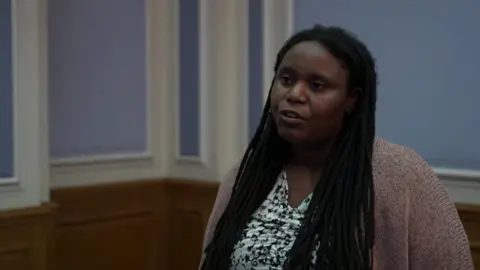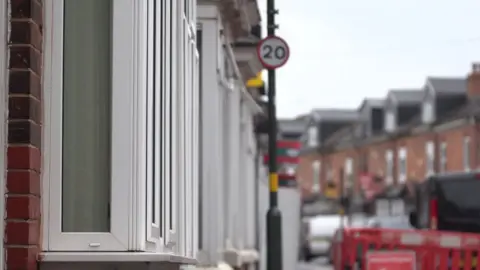Supported housing system 'a living nightmare'
 BBC
BBCFrom care leavers needing somewhere to stay, to people with mental health problems looking for a place where they can become more independent - supported accommodation rooms can be accessed by anyone.
They can also be taken on by people just looking for a cheap room.
About 600,000 people in the UK rely on supported housing at any one time, and the government says it is "vital" landlords provide a "safe, stable and supportive" place to live.
But some residents have told the BBC they have been left living alongside drug dealers and criminals, and fearing for their lives, with landlords ignoring calls for help.
The number of supported housing rooms in Birmingham has doubled in the past three years.
Landlords can apply for registered provider status, exempting them from local licensing regulations. This means councils have no powers to act over the quality and safety of accommodation or how tenants are treated.
Online adverts seen by the BBC often read "must be on DSS" so housing benefit payments can be claimed for the accommodation. Some providers reportedly claim more than £200 per week for every person they house.
While there are many good providers, a report for Birmingham City Council said the worst landlords were "trapping some of the most vulnerable people in some of the poorest accommodation with inadequate support".
Three people tell us their experiences. Their names have been changed to protect their identities.

Kyle, who is in his early 20s, found love online during lockdown and, becoming desperate for independence, rented a room in supported housing while on furlough from his job.
But his experience left him fearing for his life after being stabbed, his mum said. She is speaking out on behalf of her son, who has autism and ADHD, because of the impact it has had on his mental health.
Kyle had searched for affordable flats on Facebook in the hope of moving out of the family home and finding somewhere to live with his girlfriend, mum Christine said.
'Living nightmare'
Kyle thought he had found the perfect place, she said - the landlord was great, and offered him some work while he was on furlough from his low-paid job.
He wasn't allowed to share a room with his girlfriend, but had to get a separate room and was pressured to sign on to Universal Credit.
That was the beginning of a "living nightmare", his mother said, with drug dealers taking over one house, having money and phones stolen, and being violently attacked.
Kyle ended up in hospital with stab wounds and the matter was reported to police.

In less than a year, he lived in more than 15 properties, and was often moved across the city to another property at only a moment's notice, with his belongings put in bin bags.
Route into organised crime
In one case, Kyle was asked by men who had befriended him to put money in his bank account, then take it out in cash. In return he would get to keep some of it.
Christine said she knew this was a route into organised crime - which her vulnerable son did not see for himself.
The men soon wanted the money back, after he ignored phone calls and requests to transfer money.
"I never realised I lived a normal life before all this happened," Christine said. "Now, it's like I'm living in Nightmare on Elm Street.
"People who live in these houses are considered to be nobodies.
"These are young vulnerable people with no family, but fortunately for Kyle he had one who tried to bring him home. If we hadn't done that, he would be dead."

Whenever Christine tried to reach out to authorities, she said she was simply bounced around different agencies and charities.
She said her son was now a shadow of his former self. The family meanwhile is scared of repercussions following threats towards them.
"He's traumatised by the things he's seen in these places and what he's been through," Christine said.
In Birmingham alone there are now 22,000 supported accommodation rooms within 8,000 properties, provided by 176 registered providers.
As recently as 2018, there were just 11,500 rooms.
Not legally enforceable
In 2020, the city council launched a charter of rights after it received £1.84m from central government to run a pilot scheme to drive up standards.
The council is asking referral services, such as probation, only to direct people to providers that meet its "gold standard".
However, the charter is not legally enforceable.
Out of 176 providers, 58 are either signed up or in the process of signing up.
All exempt housing providers are overseen by the Regulator of Social Housing, however the council said it focused "mainly on financial and governance standards" of larger providers.
A spokeswoman for the regulator said it was working closely with Birmingham City Council and took any "failure to comply with our standards by any provider registered with us seriously".
"We continue to act where supported housing providers in Birmingham have breached our standards. We are monitoring their progress in putting things right and will take further action where needed," the spokeswoman added.

Twenty-year-old Zoe has lived in supported accommodation since the age of 18.
"All I want is to feel settled for once in my life. Since I was young, I've been in and out of care," she said.
'Never feel safe'
The properties Zoe has lived in have housed a wide variety of people, from ex-offenders recently out of prison to drug addicts and alcoholics, as well as care leavers like herself.
House parties, groups of men in and out day and night, and the only young female in a house, are just some of the reasons Zoe says she "never" feels safe.
"I am stuck in a cycle - a system," she said.
"They call it supported housing, but it's not. They say they will help you move on, but they just want the housing benefit.
"Living in these places it's like they want you to fail - to go to the bad side. I don't want to go down that path. I'm 20 now and don't know know how much more can I take."
In that moment, Zoe breaks down in tears.
"I've kind of given up right now. I have no hope. I have no faith in it. They don't want to help," she said.

In March, Police and Crime Commissioner David Jamieson and councillors Sharon Thompson and John Cotton wrote an open letter to Secretary of State for Housing, Robert Jenrick, calling for tighter regulation for exempt accommodation.
Landlords are simply required to provide "more than minimal" care and supervision to residents.
"I think this whole system is very broken," said Ms Thompson, the former cabinet member for homes and neighbourhoods.
From the age of 16, she was homeless herself and lived in Birmingham's hostels. She said she was "lucky" that she had a good provider.
"It's supposed to be supportive housing - it's not geared up with the person or the individual, in my view. It's all about processes. It's not just about supporting the individual people, but also protecting them as well," she said.
"At the moment what we're almost seeing is the importing of vulnerability and that is absolutely wrong. I find it so serious - it is like the routes into grooming."
'Welcome to my world'
When Erica's marriage ended last year, her husband gave notice on the flat they lived in and before she knew it she was homeless.
Rather than be evicted and qualify for emergency rehousing, Erica left and slept on friends' sofas for a few weeks - before finding some cheap rooms to rent online.
Since then, she has lived in four properties in less than a year.

"The guy who was upstairs hadn't had his fix of drugs and he lost it. He smashed every window in the house. There was blood everywhere. We were all so scared," she said.
"I was told that all I do is moan. How dare I moan because the house had no heating and no windows. I wasn't asking for lush curtains. I was asking for the basics."
She says she lives in fear and even had a knife held to her throat, but has no choice other than supported housing, because she cannot afford to live anywhere else.
Even having basic items such as food stolen by people living in the same house is taking its toll on Erica's mental health and purse.
'Stuck' in the system
Erica says she has previously threatened to expose landlords.
"I tell them that I'll go to the council and then suddenly stuff gets done. You cannot make too much of a nuisance of yourself or they will throw you out.
"You are just stuck," says Erica, whose plan is to continue to bid for council properties, even though she knows her low-priority status makes it a difficult mountain to climb.
She is getting assistance from the Shaw Trust, as part of its Work & Health programme, and The Salvation Army, but at the moment it is hard for her to see a way out.
"Unless a miracle happens then I'll be living here till the day I die," she said.

Birmingham, Bristol, Hull, Blackburn and Blackpool have been given a combined £5.4m from government to test ways to improve standards in exempt accommodation.
A spokeswoman for the Ministry of Housing, Communities & Local Government said all supported housing "should be of good quality and provide the right support for residents".
'Horror stories'
She said the five pilot areas would trial new approaches "to crack down on the small number of landlords who provide inadequate support to vulnerable people living in supported housing".
Matt Downie, director of policy for homelessness charity Crisis, said he had heard horror stories of exploitation, violence and vulnerability across the country as supported accommodation grows "at an alarming rate... because people can see the money that is involved".
"This can be a genuine market," he said. "There are good provisions by local authorities, the housing authority, charities and others - and some housing associations."
Instead of funding for the pilot schemes, Mr Downie called for tighter regulation to "make sure the wrong people are not in this market" and tenants are not "left stranded in appalling conditions without the support they need".
If you have been affected by the issues raised, support is available via BBC Action Line.

Follow BBC West Midlands on Facebook, Twitter and Instagram. Send your story ideas to: [email protected]
